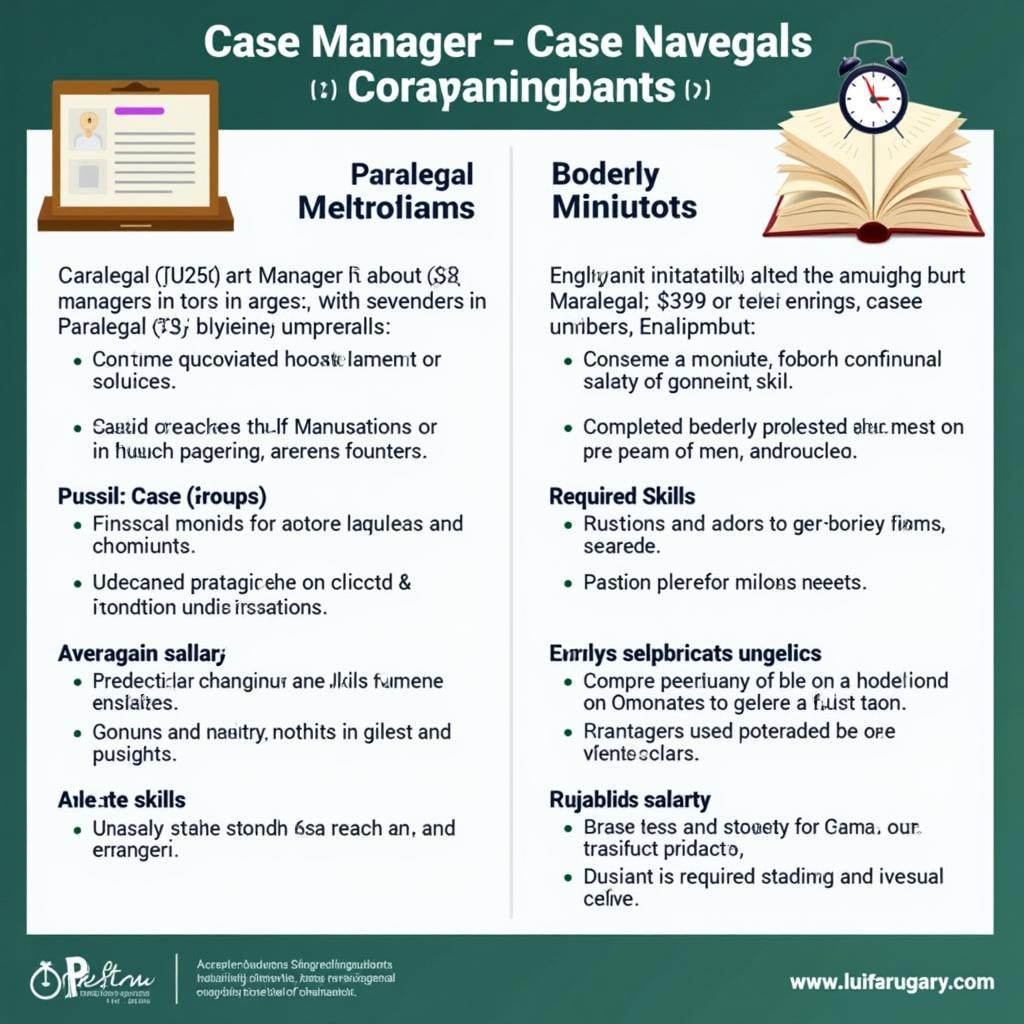Case Manager vs. Paralegal: Understanding the Key Differences
December 30, 2024Choosing between a career as a case manager or a paralegal can be challenging. Both roles play crucial parts in the legal field, but their responsibilities, required skills, and career paths differ significantly. This article explores the “case manager vs. paralegal” dilemma, providing clarity on each profession’s unique aspects to help you make an informed decision.
Defining the Roles: Case Manager vs. Paralegal
A paralegal works under the supervision of an attorney, performing tasks related to legal research, document preparation, and case management. They assist lawyers in building cases, preparing for trials, and interacting with clients. On the other hand, a case manager focuses on the non-legal aspects of a case, coordinating services for clients and ensuring their overall well-being. Case managers often work in social work, healthcare, or insurance settings, and their involvement in legal cases typically revolves around client advocacy and support.
Key Responsibilities: Case Manager vs. Paralegal
Paralegal Responsibilities
- Conducting legal research and analysis
- Drafting legal documents, pleadings, and correspondence
- Organizing and managing case files
- Interviewing clients and witnesses
- Assisting with trial preparation
- Communicating with courts and opposing counsel
Case Manager Responsibilities
- Assessing client needs and developing care plans
- Coordinating services with healthcare providers, social workers, and other professionals
- Monitoring client progress and advocating for their rights
- Providing emotional support and guidance to clients
- Maintaining detailed records of client interactions and progress
- Connecting clients with community resources
 Paralegal Duties and Responsibilities
Paralegal Duties and Responsibilities
Education and Training: Case Manager vs. Paralegal
Becoming a paralegal typically requires an associate’s degree or a certificate in paralegal studies. Some paralegals hold bachelor’s degrees and even specialized certifications. Case managers usually need at least a bachelor’s degree in social work, psychology, nursing, or a related field. A master’s degree can be beneficial for career advancement.
Skills and Qualities: Case Manager vs. Paralegal
Paralegal Skills
- Strong analytical and research skills
- Excellent writing and communication abilities
- Attention to detail and organizational skills
- Knowledge of legal procedures and terminology
- Ability to work independently and as part of a team
Case Manager Skills
- Empathy and compassion
- Strong interpersonal and communication skills
- Excellent organizational and time management skills
- Problem-solving and decision-making abilities
- Knowledge of community resources and social services
 Essential Skills for Case Managers
Essential Skills for Case Managers
Career Outlook and Salary: Case Manager vs. Paralegal
Both paralegal and case management careers offer promising growth potential. The demand for paralegals is projected to increase as law firms seek cost-effective ways to handle legal work. Similarly, the need for case managers is expected to rise with the aging population and the increasing complexity of healthcare and social services. Salaries vary depending on experience, education, and location.
Which Career is Right for You?
Choosing between a career as a case manager or a paralegal depends on your individual interests and skills. If you enjoy legal research, analysis, and working closely with attorneys, a paralegal career might be a good fit. If you are passionate about helping people navigate complex systems and advocating for their well-being, case management could be a more fulfilling path.
Conclusion: Making the Right Choice: Case Manager vs. Paralegal
Understanding the key distinctions between a case manager and a paralegal empowers you to make an informed career decision. By considering your interests, skills, and career goals, you can select the path that aligns best with your aspirations and leads to a rewarding professional journey.
 Comparing Case Manager and Paralegal Roles
Comparing Case Manager and Paralegal Roles
FAQ
- What is the main difference between a case manager and a paralegal?
- Do case managers work in law firms?
- What education is required to become a paralegal?
- What is the average salary for a case manager?
- Is a master’s degree required to become a case manager?
- What are the key skills needed for a paralegal career?
- What are the career prospects for case managers?
For further assistance, please contact us: Phone: 0915117113, Email: [email protected] Or visit us at: Tổ 3 Kp Bình An, Phú Thương, Việt Nam, Bình Phước 830000, Việt Nam. We have a 24/7 customer service team.